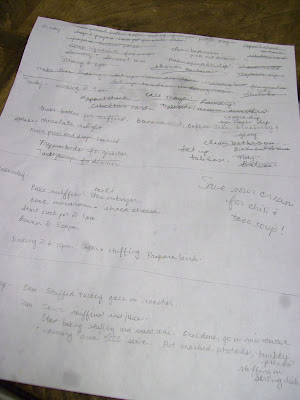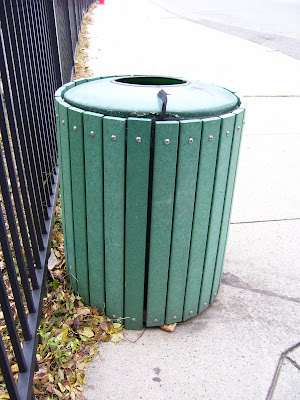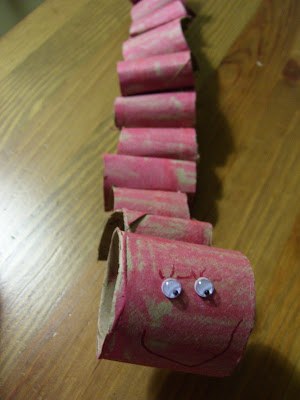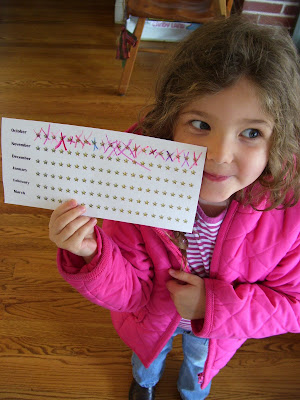



 This is a picture of my "to do" list for this holiday week and the reason I may not blog for a few days. And, this is just the stuff I had to write down so that I would remember! It doesn't even mention the more obvious things like "nurse the baby" and "answer the telephone." Notice I've crossed out most of what's on Monday and Tuesday and if I continue to stay on schedule, I'll get it all done and right on time. Happy Thanksgiving everyone!
This is a picture of my "to do" list for this holiday week and the reason I may not blog for a few days. And, this is just the stuff I had to write down so that I would remember! It doesn't even mention the more obvious things like "nurse the baby" and "answer the telephone." Notice I've crossed out most of what's on Monday and Tuesday and if I continue to stay on schedule, I'll get it all done and right on time. Happy Thanksgiving everyone!

 They are Norah's favorite part of the school day, Developing the Early Learner Books 1, 2, 3, and 4. The books came with our curriculum, Sonlight's Core P4/5, but they are also available for individual sale. We are almost through the first book now, doing a page or two a day. They have unique activities in them, not just your typical workbook exercises. Our favorite is when I have set a timer, call out a set of directions such as "Color the bulb yellow. Color the umbrella red." That's when I start the timer and Norah has to wait until it beeps to do what I said, remembering the directions for a whole minute before she has to do them. It can be pretty tough, especially if she spends the minute chatting with me instead of concentrating on what she has to do.
They are Norah's favorite part of the school day, Developing the Early Learner Books 1, 2, 3, and 4. The books came with our curriculum, Sonlight's Core P4/5, but they are also available for individual sale. We are almost through the first book now, doing a page or two a day. They have unique activities in them, not just your typical workbook exercises. Our favorite is when I have set a timer, call out a set of directions such as "Color the bulb yellow. Color the umbrella red." That's when I start the timer and Norah has to wait until it beeps to do what I said, remembering the directions for a whole minute before she has to do them. It can be pretty tough, especially if she spends the minute chatting with me instead of concentrating on what she has to do. We bought Norah a Webkinz with some birthday money she received in the mail. (Thanks Aunt Michelle). But, now, she wants to play with it all the time...
We bought Norah a Webkinz with some birthday money she received in the mail. (Thanks Aunt Michelle). But, now, she wants to play with it all the time... Avril loves to play our family's version of Peek-a-boo, one in which we rarely ever actually say the words, "Peek-a-boo." Rather, we cover her face with the blanket and ask, "Where's Avril?!" She waits for a second, actually understanding that we can't see her, then she grabs the blanket, pulling it down to reveal herself and that's when we say, "There she is!" And then we all laugh together. We taught Norah to do this at the same age, too, and with the same exact blanket. I'm not sure there is anything more satisfying than making a baby laugh so hard she kicks and squeals. It's that "Man, it's good to be alive" kind of feeling.
Avril loves to play our family's version of Peek-a-boo, one in which we rarely ever actually say the words, "Peek-a-boo." Rather, we cover her face with the blanket and ask, "Where's Avril?!" She waits for a second, actually understanding that we can't see her, then she grabs the blanket, pulling it down to reveal herself and that's when we say, "There she is!" And then we all laugh together. We taught Norah to do this at the same age, too, and with the same exact blanket. I'm not sure there is anything more satisfying than making a baby laugh so hard she kicks and squeals. It's that "Man, it's good to be alive" kind of feeling.

 On my way home, I drove past an eighty year old woman whose house is at the bottom of our hill. She was raking up leaves in her yard, bending over and putting them into large brown paper bags. Next, a few houses past hers and a little farther up the hill, I passed a young man. He was working in his yard, too, blowing the leaves out into the street with a power blower. When I finally pulled into my driveway at the top of the mountain, I turned off the engine and sat there for a minute. Something, no, several things about the whole scene just seemed wrong.
On my way home, I drove past an eighty year old woman whose house is at the bottom of our hill. She was raking up leaves in her yard, bending over and putting them into large brown paper bags. Next, a few houses past hers and a little farther up the hill, I passed a young man. He was working in his yard, too, blowing the leaves out into the street with a power blower. When I finally pulled into my driveway at the top of the mountain, I turned off the engine and sat there for a minute. Something, no, several things about the whole scene just seemed wrong.

 If you want to encourage your kids to learn apart from school, I support that. If you want to empower them to follow their interests, I support that. If you want to promote freedom and comfort and let your children wear pajamas all day, I support that. If you want to inspire creativity and let them wear cowboy or Indian costumes while they work, I support that one, too.
If you want to encourage your kids to learn apart from school, I support that. If you want to empower them to follow their interests, I support that. If you want to promote freedom and comfort and let your children wear pajamas all day, I support that. If you want to inspire creativity and let them wear cowboy or Indian costumes while they work, I support that one, too. I know my posts about homeschooling are usually all blue skies and roses, but I've been noticing something. The more I mingle with homeschooling moms, the more I see that we generally come in two types and those two types are very different.
I know my posts about homeschooling are usually all blue skies and roses, but I've been noticing something. The more I mingle with homeschooling moms, the more I see that we generally come in two types and those two types are very different.
 We used Norah's Halloween candy (or what was left of it) to make a bar graph. We skipped our regular math lesson for that day and did this instead. Gasp! And, when were done, we even ate some candy, making our graph incorrect with only a few quick chews and swallows. Yum!
We used Norah's Halloween candy (or what was left of it) to make a bar graph. We skipped our regular math lesson for that day and did this instead. Gasp! And, when were done, we even ate some candy, making our graph incorrect with only a few quick chews and swallows. Yum!
 When it snows, she has no fear for her household;
When it snows, she has no fear for her household; Norah this Halloween and Norah on Halloween two years ago.
Norah this Halloween and Norah on Halloween two years ago.  I was given this poem by an ex-navy co-worker who left after six years in “the hole.” While I cannot say I know what my brother is feeling, I do know his is a thankless job for a crappy employer. Brandt, our hearts and prayers are with you.
I was given this poem by an ex-navy co-worker who left after six years in “the hole.” While I cannot say I know what my brother is feeling, I do know his is a thankless job for a crappy employer. Brandt, our hearts and prayers are with you.SNIPE'S LAMENT
Now each of us from time to time has gazed upon the sea
and watched the mighty warships pulling out to keep this country free.
And most of us have read a book or heard a lusty tale,
about these men who sail these ships through lightning, wind and hail.
But there's a place within each ship that legend's fail to teach.
It's down below the water-line and it takes a living toll
- - a hot metal living hell, that sailors call the "Hole."
It houses engines run with steam that makes the shafts go round.
A place of fire, noise, and heat that beats your spirits down.
Where boilers like a hellish heart, with blood of angry steam,
are molded gods without remorse, are nightmares in a dream.
Whose threat from the fires roar, is like a living doubt,
that at any moment with such scorn, might escape and crush you out.
Where turbines scream like tortured souls, alone and lost in Hell,
are ordered from above somewhere, they answer every bell.
The men who keep the fires lit and make the engines run,
are strangers to the light and rarely see the sun.
They have no time for man or God, no tolerance for fear,
their aspect pays no living thing a tribute of a tear.
For there's not much that men can do that these men haven't done,
beneath the decks, deep in the hole, to make the engines run.
And every hour of every day they keep the watch in Hell,
for if the fires ever fail their ship's a useless shell.
When ships converge to have a war upon an angry sea,
the men below just grimly smile at what their fate will be.
They're locked below like men fore-doomed, who hear no battle cry,
it's well assumed that if they're hit men below will die.
For every day's a war down there when gauges all read red,
twelve-hundred pounds of heated steam can kill you mighty dead.
So if you ever write their songs or try to tell their tale,
the very words would make you hear a fired furnace's wail.
And people as a general rule don't hear of these men of steel,
so little heard about this place that sailors call the "Hole."
But I can sing about this place and try to make you see,
the hardened life of the men down there, 'cause one of them is me.
I've seen these sweat-soaked heroes fight in superheated air,
to keep their ship alive and right, though no one knows they're there.
And thus they'll fight for ages on till warships sail no more,
amid the boiler's mighty heat and the turbine's hellish roar.
So when you see a ship pull out to meet a war-like foe,
remember faintly if you can, "The Men Who Sail Below."
-Anonymous
 Norah made this cool caterpillar out of a paper towel roll. Though... hers ended up looking more like a snake than a caterpillar since it is sooooo long and we didn't put antenna on it. But, it's a keeper, none the less. Click here and scroll down for the directions.
Norah made this cool caterpillar out of a paper towel roll. Though... hers ended up looking more like a snake than a caterpillar since it is sooooo long and we didn't put antenna on it. But, it's a keeper, none the less. Click here and scroll down for the directions.
 It was very windy and a little wet, but we seized the late Saturday afternoon to build a campfire in our backyard. We toasted bologna cheese sandwiches for a fun dinner before we went trick-or-treating.
It was very windy and a little wet, but we seized the late Saturday afternoon to build a campfire in our backyard. We toasted bologna cheese sandwiches for a fun dinner before we went trick-or-treating. Avril was all bundled up, of course. You can see her two teeth coming in on the bottom.
Avril was all bundled up, of course. You can see her two teeth coming in on the bottom. My big girl Norah helped toast her own sandwich, that is... until she almost swung her red-hot toaster around and hit me and the baby with it. Sigh... But, the pictures turned out nice.
My big girl Norah helped toast her own sandwich, that is... until she almost swung her red-hot toaster around and hit me and the baby with it. Sigh... But, the pictures turned out nice. Norah's costume turned out fantastic, if I may say so myself. She ended up loving it. How do I know? Besides the fact that she skipped everywhere, looking down at herself, almost running into walls all night, when I put this on her, she was overcome by joy, grabbed my neck, hugged me and said, "I love you so much, Mom!" Sniffle. Sniffle.
Norah's costume turned out fantastic, if I may say so myself. She ended up loving it. How do I know? Besides the fact that she skipped everywhere, looking down at herself, almost running into walls all night, when I put this on her, she was overcome by joy, grabbed my neck, hugged me and said, "I love you so much, Mom!" Sniffle. Sniffle. And, that's not a real knife, by the way. We covered her plastic toy kitchen knife's handle with masking tape, which Norah then painted brown...
And, that's not a real knife, by the way. We covered her plastic toy kitchen knife's handle with masking tape, which Norah then painted brown... This is one child's take from walking two blocks. Just two blocks! When I was a kid, we had to trick-or-treat for miles, up hill, both ways! and we still came home with mostly Smarties and Sweet Tarts!
This is one child's take from walking two blocks. Just two blocks! When I was a kid, we had to trick-or-treat for miles, up hill, both ways! and we still came home with mostly Smarties and Sweet Tarts!
 Norah finished her goal of reading twenty pages and/or Bob's books on Friday afternoon, so we were able to take her to get her first free pizza with the Book It program.
Norah finished her goal of reading twenty pages and/or Bob's books on Friday afternoon, so we were able to take her to get her first free pizza with the Book It program. This is the page she read to us right before we left to have dinner. Notice the page has the word "woodshed" on it. After reading it, Norah asked, "What's a 'woodshed?'" and at that, Dwayne and I had to ask ourselves through chuckles whether or not we were raising her right.
This is the page she read to us right before we left to have dinner. Notice the page has the word "woodshed" on it. After reading it, Norah asked, "What's a 'woodshed?'" and at that, Dwayne and I had to ask ourselves through chuckles whether or not we were raising her right. We haven't had Pizza Hut in years, literally, so we gave Norah a hearty and genuine "Thanks" for working so hard on her reading because we were able to enjoy a dinner out with her. Obviously, even though her pizza was free, we had to pay for ours, but Norah felt good about herself, about doing something we could all share in, and we felt good about saving our extra money up in order to do this, not eating out too much at other places so we could go out and celebrate with her.
We haven't had Pizza Hut in years, literally, so we gave Norah a hearty and genuine "Thanks" for working so hard on her reading because we were able to enjoy a dinner out with her. Obviously, even though her pizza was free, we had to pay for ours, but Norah felt good about herself, about doing something we could all share in, and we felt good about saving our extra money up in order to do this, not eating out too much at other places so we could go out and celebrate with her.We are still doing some homeschool work through the early summer. In the photo above, both girls are doing their Latin. Adele is following ...
